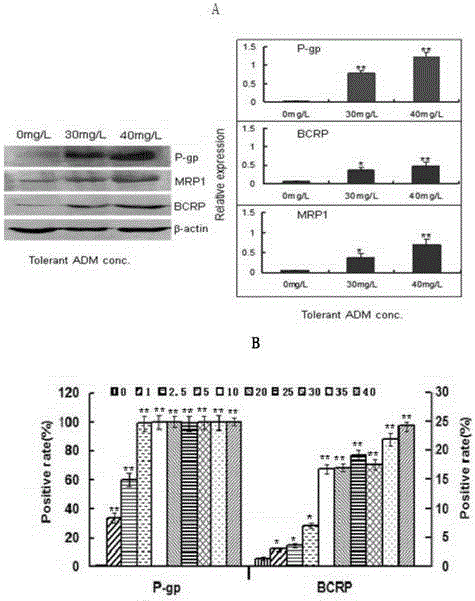Human leukemia hl-60 cell drug-resistant cell line hl-60/rs cell and preparation method thereof
A technology for drug-resistant cells and leukemia, applied in biochemical equipment and methods, animal cells, tumors/cancer cells, etc., can solve problems such as lack of arsenic resistance and arsenic sensitivity
- Summary
- Abstract
- Description
- Claims
- Application Information
AI Technical Summary
Problems solved by technology
Method used
Image
Examples
Embodiment 1
[0044] Adriamycin was used as an inducer to induce HL-60 cells to establish multidrug-resistant cell lines. ① HL-60 was inoculated in RPMI 1640 culture medium containing 15% newborn bovine serum, 100 U / mL penicillin, 100 μg / mL streptomycin, placed at 37°C, 5% CO 2, in a saturated humidity incubator. ②Add doxorubicin to the cell culture system, the initial impact concentration is 0.1mg / L, and when the surviving cells return to normal growth, add the same concentration of drugs to induce, and so on, until the cells can survive and proliferate normally at this concentration , then increase the impact drug concentration, and carry out the second round of impact induction, and the drug concentration increase range is 0.1mg / L. Such repeated intermittent shock induction, and with the increase in the number of shock inductions and drug resistance, the increase in drug concentration in each round of shock is gradually increased, the initial range is small, and the amplitude in the lat...
Embodiment 2
[0046] The induction establishment method of HL-60 / RS cells is the same as that in Example 1. One month after the stable growth of HL-60 / RS cells, the sensitivity to arsenic trioxide was determined. HL-60 / RS cells (choose HL-60 sensitive cells, K562 / ADM multidrug-resistant cells and their parental K562 cells as controls), press 1.0×10 5 cells / mL inoculated in 96-well culture plate, adding 0.1-5.0mg / L As 2 o 3 , 37℃, 5%CO 2 And cultured under saturated humidity conditions for 24-72h, MTT assay cell proliferation inhibition and IC50. HL-60 / RS cells are highly resistant to arsenic trioxide, 12.89 times that of parental HL-60 cells and 10.89 times that of K562 / ADM drug-resistant cells.
Embodiment 3
[0048] The induction establishment method of HL-60 / RS cells is the same as that in Example 1. HL-60 / RS cells and control HL-60 cells, K562 cells and K562 / ADM cells were extracted by TRIZOL method for total RNA and total protein by RIPA lysate, and real-time fluorescence quantitative RT-PCR method and Western blot were used respectively The expression of arsenic transport related proteins MRP1, MRP2 and ASNA1 was detected by the method. The expression of MRP (MRP1 and MRP2) in HL-60 / RS cells was significantly higher than that in HL-60 cells and K562 / ADM cells; the expression of ASNA1 in HL-60 / RS cells was significantly higher than that in HL-60 cells and K562 / ADM cells, respectively It is 7.34 times of K562 / ADM cells and 2.45 times of HL-60 cells. The expression level of K562 / ADM cells was 0.83 times that of K562 cells. Expression levels of MRP and ASNA1 were consistent with arsenic trioxide sensitivity.
PUM
 Login to View More
Login to View More Abstract
Description
Claims
Application Information
 Login to View More
Login to View More - R&D
- Intellectual Property
- Life Sciences
- Materials
- Tech Scout
- Unparalleled Data Quality
- Higher Quality Content
- 60% Fewer Hallucinations
Browse by: Latest US Patents, China's latest patents, Technical Efficacy Thesaurus, Application Domain, Technology Topic, Popular Technical Reports.
© 2025 PatSnap. All rights reserved.Legal|Privacy policy|Modern Slavery Act Transparency Statement|Sitemap|About US| Contact US: help@patsnap.com



